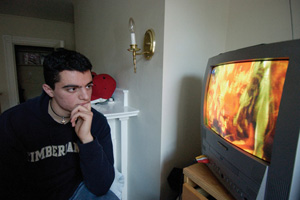 |
|
||
|
|||
Cable TV in residences a lifeline abroad for international students
By Jessica Ullian
|
|
Jeff Soto (ENG’08) watches the show Star Academy on the Lebanese Broadcasting Corporation from his room on Bay State Road. “You can see things directly and pretty much feel like you’re there,” he says. Photo by Kalman Zabarsky |
|
The members of the Lebanese Club at Boston University usually rely on Internet news sites to keep them informed about events taking place in their home country, but at times the Internet isn’t enough. When thousands of Lebanese citizens gathered in Beirut to protest the killing of former prime minister Rafik al-Hariri (Hon.’86) last month, the students wanted to watch events as they were happening. The recent addition of cable television to BU’s dormitories allowed them to do so.
Club officers called James Shea, director of the Office of Telecommunications, on a Thursday to ask for programming from the Lebanese Broadcasting Corporation (LBC). By Monday, the day of the largest demonstration, the students were watching downtown Beirut from their dorm rooms.
“Today is a day that will go down in history,” David Tayeh (ENG’06) wrote in an e-mail thanking Shea. “Maybe you can see the people gathered in downtown Beirut shouting, ‘Freedom, sovereignty, independence!’ You made this day a celebration at BU with the Lebanese people and all the free people of the world.”
Last year, in response to student demand, the administration decided to bring cable television to the dormitories. The network was installed in December and January, and students returned from winter break to more than 100 channels, including the usual suspects of CNN, ESPN, and MTV, as well as 21 international stations providing political and cultural news from around the world.
On one hand, the arrival of cable television provides a new form of entertainment. But many students and faculty say that access to cable’s news, arts, and science programming can play an important role in higher education. And according to students who are far from home, seeing the same programs they used to watch at home can ease the adjustment process.
“They keep us closer to what’s happening,” says Jeff Soto (ENG’08), who arrived in the United States in August and is from Zgharta, Lebanon. “You can see things directly and pretty much feel like you’re there.”
The process of bringing cable to the University was initiated when President ad interim Aram Chobanian took office in 2003, and began asking students what they wanted from the University. One of the most common complaints, says Shea, was the lack of cable in the dorms, giving students only the most basic network channels and generally poor reception “full of popcorn and snow.”
A steering committee was formed to look at other research institutions with large undergraduate populations, and the group ultimately chose a network provider that could offer 105 channels, including all the major public and cable networks. They decided against offering premium channels such as HBO, says Shea, but the students “were adamant that the sports channels were a necessity.”
The resulting programming — transmitted around campus through a fiber-optic network completed last November — offers a blend of information, entertainment, and University-specific programming. The network offers four versions of the Discovery Channel, three MTV stations, and eight sports networks, including the NFL Network and College Sports TV. In addition, University announcements will be broadcast by the Office of Information Technology on channel 13, the College of Communication will begin showing student programs on channel 10 in September, and the student radio station, WTBU, can be heard on channel 3.
“This is a guaranteed transmission into every dorm room,” says Anne Donohue, a COM associate professor of journalism and WTBU faculty advisor. “It will hopefully increase our reach and increase our professionalism.”
The international networks present a similar variety of broadcasts. While students can watch the news on China’s Phoenix TV or the Canadian Newsworld International network, they can also watch Bollywood movies from India on the B4U network, or Star Academy, the Middle Eastern answer to American Idol, on LBC. Other program offerings include Japanese cooking shows, Russian talk shows, and Spanish telenovelas, or soap operas.
“I think international students would be pleased,” says Urbain DeWinter, associate provost for international programs, of the programming options. “They can stay in touch with their local news, sports, and other events at home through the international cable TV stations.”
The networks were selected based on the service provider’s options, not University demographics, but the stations do cover many of the University’s largest international populations. Of the 4,558 international students enrolled last semester, the largest numbers are from China, Korea, and India; the network currently offers three Chinese channels broadcast in Mandarin and Cantonese, one Korean network, and two Indian stations. Channels from Canada, England, France, Greece, Italy, Pakistan, and Taiwan are also included.
The process of bringing cable to campus is nearly complete, Shea says; all but two dormitories have been connected to the network, and those two — 1110 Commonwealth Ave. and 481-483 Commonwealth Ave. — have been linked up to approximately 70 channels via satellite dish. The Office of Telecommunications now is busy responding to student requests. Many want the German network Deutsche Welle, and others want the Bravo Network, where they can watch Inside the Actors’ Studio. Both will be added over the summer, says Shea.
“The feeling on campus has been very positive,” he says. “It was very heartwarming.”
The members of the Lebanese Club are also pleased. With cable in their dorm rooms, they were able to watch an important moment in their country’s history and share the experience with their families. “It really showed what Lebanon is to everybody here,” Soto says. “We wanted to see the country united.”
![]()
25
March 2005
Boston University
Office of University Relations
